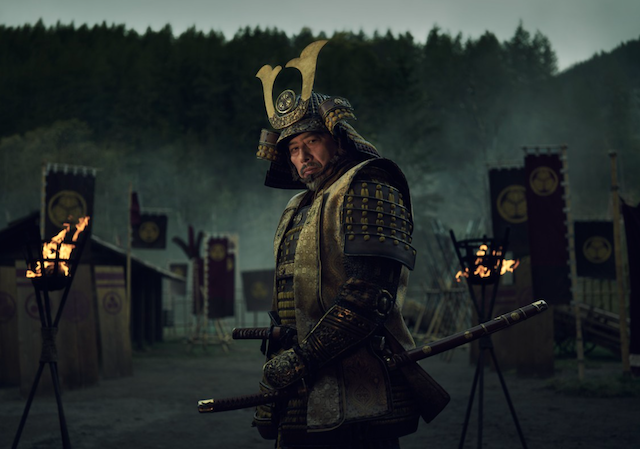
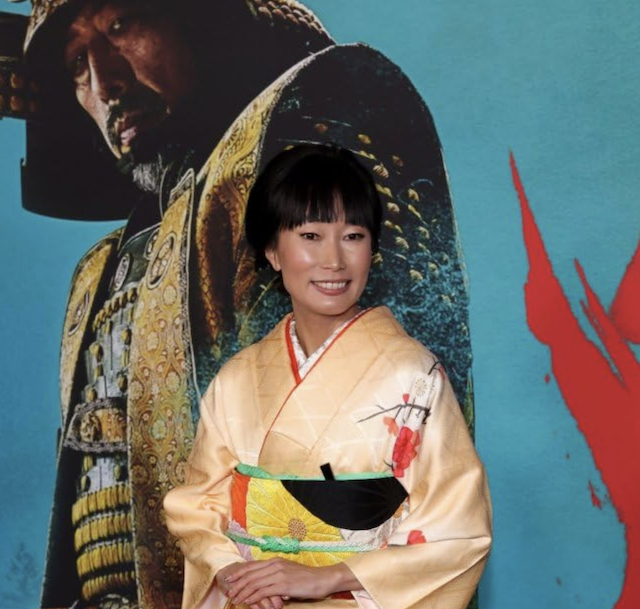
© 2024, FX. All Rights Reserved.
Exclusive Interview with Producer Eriko Miyagawa
Q : I heard that you left Japan when you were 18 years old. What was the motivation to study abroad then?
Eriko Miyagawa: Yes. I was 18. I think I wanted to go to America and become an international person at that time. My idol was Sadako Ogata-san [the first Japanese to serve as UN High Commissioner for Refugees] who used to run UNHCR. I think an image of her wearing those bulletproof vests in the war fields of Bosnia left such a kind of indelible mark in my head.
And I think, at that time, the Internet was still new. And nobody around me was going to colleges in the United States. I didn’t have very many resources, but I did look up and learn that she had gone to the school called Georgetown in Washington, D.C. So I applied there and I got in. And so that was what motivated me.
Q : You specialize in bridging language and culture systems in your filmmaking. I heard that your job started from Kill Bill, as a translator. How did you land that job?
Eriko Miyagawa: Yeah, it’s like so random, such a total stroke of luck. But at Georgetown, my major was called culture and politics, which is like international relations. But I had minored in East Asian studies. I’ve always been interested in China. I studied Chinese. I studied in China and Taiwan during my sophomore year. And I had some expat friends in Beijing.
After I graduated from Georgetown, I didn’t know what to do with my life. And I couldn’t get any jobs, then I got this email saying that Quentin Tarantino is shooting a film in Beijing. It’s in Beijing but the story is supposed to be in Japan and they can’t find a Japanese English translator.
I flew one way to China and showed up—then they hired me. I was very lucky. Being an interpreter can be a very great way to learn because you may not have the experience or knowledge, but you’re exposed to many things. I was translating between actors and the director in the art department, which was entirely Japanese. I worked very closely with them. I’d never worked on a film set. It was my first experience but I was so lucky to have such an in-depth and broad exposure.
Q : What was it like working with Quentin Tarantino? You started from the top!
Eriko Miyagawa: Yeah!! It was such fun. At that time, he was already a big star, and the film Pulp Fiction was a global phenomenon. I was just a translator, so that’s why I didn’t think twice about applying myself, He was kind of goofy and you know he was so excited to be making this film. It was such a unique time in China because China was starting to open up.
There weren’t many foreigners. I think it was the first non-Chinese film to be shot in Beijing Film Studio. And Beijing Film Studio was created to produce Communist Party propaganda films. For us to be there it was a unique and special experience. And Quentin was so happy to be making this film in this unique place. And I think that was contagious, it was my first film. So it felt like a summer camp—lol.
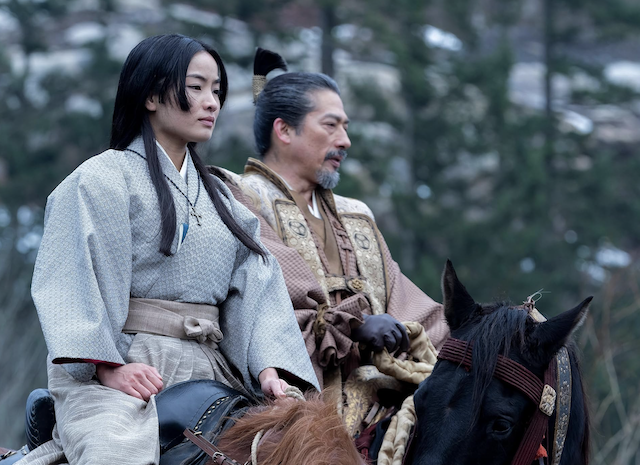
© 2024, FX. All Rights Reserved.
Q : Since this Kill Bill job, how did you work your way up to become a producer? I know that you also worked on Martin Scorsese’s film, Silence. So how did you work your way up to become the producer? Did you do all those coordinating jobs or liaison types of jobs?
Eriko Miyagawa: Yeah, exactly. I think you work your way up slowly. I started coordinating and being a liaison. I try not to limit myself to one department because I always knew I wanted to produce—and to produce things, nothing is wasted. So it’s good to know about wardrobe, it’s good to know about the art department, and it’s good to know about accounting. And so I took every opportunity, I worked in many departments and also as an interpreter. I slowly worked my way up. Shogun was a big thing, but my thing is servicing non- American or international films with Japanese elements by supporting and providing what needs to be done on the Japanese side creatively and practically.
And when that volume is high, I’m called a producer and when that volume is low sometimes I’m a consultant or liaison. I’m not stuck on having to be called a producer. I think I’m just always wanting to support projects with Japanese elements and make sure Japan is well represented.
Q : How did you become a co-producer on the Scorsese film, Silence?
Eriko Miyagawa: Yeah, it came at the end. I worked on it for a long time over 10 years, So at the very beginning, I was this liaison fixture-type person.
Q : I remembered Scorsese took time to get the rights for Endo Shusaku’s book.
Eriko Miyagawa: Yeah, it was a very difficult film to pull off, even for someone so famous and established as Martin Scorsese, because it’s such a specific story. I did anything that they wanted me to ask. They wanted me to go to Nagasaki and the places where the story took place, in a way like Shinahan (location scouting). I met with Endo Shusaku’s family and went to his museum.
I took photos of every single place that might inspire the writing process. Then when things moved forward, I facilitated casting. When the director came, I also facilitated the scout. Gradually, I took on more responsibility. Then when we were finally shooting, I forgot my title back then, but I was overseeing all the Japanese elements. And I remember Scorsese’s producer introducing me to other people like, “Oh, Eriko is like all things Japan”—lol
Q : I imagine that you are probably going to work with another Scorsese movie that is based on Endo Shusaku’s book, A Life of Jesus, right?
Eriko Miyagawa: Yeah, I’m not sure if I’m allowed to say it. I did speak with someone there. I think they’re working on it, [but] it’s not confirmed that it’s going to be his next project. It is based on Endo Shusaku’s book, but it doesn’t have many Japanese elements, unfortunately. I love to do any work on anything with Scorsese.
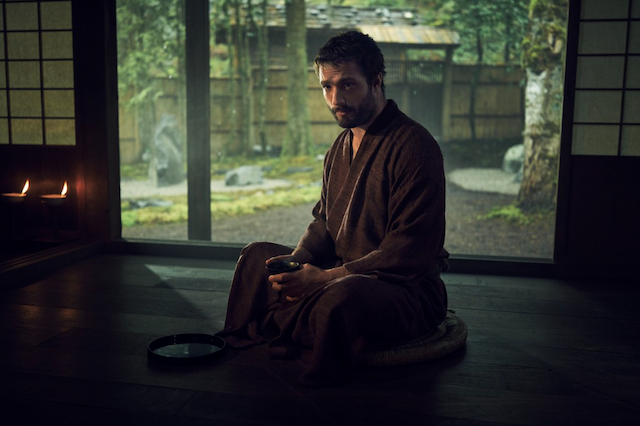
© 2024, FX. All Rights Reserved.
Q : Let’s get into Shogun. I heard you read the original James Clavell’s books, not only in English, but also in Japanese because obviously the screenplay is going to be in English, but most of the cast members are Japanese. So you have to fill in the gap of what’s not translated in English there. Were you conscious about that—is that why you read in both Japanese and English?
Eriko Miyagawa: Yeah, definitely. The original book was written in English, so it was absolutely necessary for me to read the original book, because I think that’s going to be the stone and grounding, where everything would start. It was very important that I read the original book. And then the translation of the book in the 80s. That would be the major reference point for the translation team.
All the choices that were made back then—the translator, Ichiro Miyagawa-san made some creative decisions about kanji characters or a lot of the wording. I think we had to honor that as much as reasonably possible. That was just a starting point, to really have a grasp of the original work and the work that was created in the 80s, and then start from there, because we keep going back to it, no matter what.
Q: I see. So speaking of the original Shogun series in the 1980s, are there any differences in adapting the book from the original series and this series?
Eriko Miyagawa: Yeah, very much. This current Shogun is labeled as a remake, but it’s not. It’s not really a remake—it is a re-adaptation of the novel. So I think it’s quite different from the show in the 80s. The 80’s one speaks for that specific time. It was groundbreaking, a very successful series at the time. And then our current show hopefully does the same while speaking specifically for this time and breaking the ground today.
Q : Not only translating the original book into Japanese, but also the old Japanese language in 1600. So what kind of preparation did you and your team do regarding mannerisms and rituals with a Japanese culture that was grounded in 1600?
Eriko Miyagawa: Yeah, so first of all, in terms of dialogue, it’s quite fascinating because obviously if people speak in the way that was actually spoken at that time, nobody would understand it. I wouldn’t understand it. I think nobody knows exactly, right? Because the language evolved so much.
So that’s what we did—we learned from other jidaigeki (period piece) films and also taiga drama. (Taiga drama is the name NHK gives to the annual year long historical drama television series it broadcasts in Japan).
And at the same time, it was our aspiration to bring in a younger generation of Japanese audiences to jidaigeki. It was a constant conversation, especially with Sanada-san, to figure out what the language of our show should be, And Sanada-san is so knowledgeable, so experienced. So, when it was translated, the dialogues were polished by Kyoko Moriwaki-san who is based in Kyoto. She’s a screenwriter who would polish it so that it would sound like jidaigeki, classical Japanese.
With Sanada san, we just kept polishing to figure out what was right for the show. And in the scenes we went for shosa (traditional Japanese behavior and mannerism) movement and other details. Everything was specifically considered for the show.
We brought in three shosa movement coaches from Japan, and all of them are quite experienced in jidaigeki. All of them are actors themselves. They kept training the actors and background extras how to walk, how to bow, how to close a shoji screen.
How would the high-ranking people carry themselves? And how did their servants carry themselves? How would the villagers bow? Every single thing was vetted and decided specifically for the show and for each of the scenes.
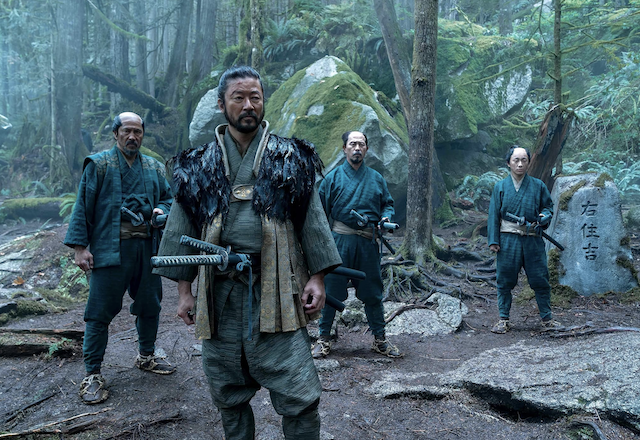
© 2024, FX. All Rights Reserved.
Q : I heard that some of the dialogues were changed on the set while you were working on the action scene or all those sequences. But how closely did you work with Hiroyuki Sanada-san on a daily basis to make it authentic while changing some dialogues?
Eriko Miyagawa: Yeah, very closely. Sanada-san is very hands-on. I don’t know how he does it because he’s the lead of the show. And he was very busy but very hands-on. And the checking went in different stages. Once the script was ready, we were given the script.
And sometimes Sanada-san might have notes. My job is to focus more on making sure the original English writing of all the nuances is accurately carried into these Japanese dialogues. It’s not always possible, right?
You are also bilingual, so you know that languages are so different. Anyways, so he would check on that stage, but also when we were shooting, most of the time we’re sitting next to each other, next to Justin (Marks) at the producer’s tent, and we’re looking at the monitors together.
And in terms of last-minute changes sometimes Justin might be looking at the monitors. He might’ve seen the rough cut of certain scenes and he might have different ideas. And he’ll be like, “oh I know it’s last minute, but can we make this change?” And then we would quickly figure out what the best translation would be.
And then we would communicate with the actors. Sometimes actors would have requests, as American actors would have, like sometimes it doesn’t feel right. Sometimes it doesn’t feel like their character. Sometimes once they act out, it doesn’t fit the scene.
So yeah, we just constantly kept adjusting. And yeah, Hiro-san is so hands-on, even throughout post production. He’s present, he joined all the Japanese actors in the ADR session loop groups, via Zoom. And he was always there to help with adjustments of the dialogues and words. Yeah, everything like in a loop group, because we would record like, for example, when there’s an earthquake happening and you see all the soldiers far away saying, “Oh, no, be careful.” Even for those words, Hiro-san was available to make sure they’ll sound authentic.
Q : Yeah, I really find it’s rare that, particularly, the producer has so much involvement with visual effects and the post-production stage. Because in order to translate what Hiro-san was feeling, I’m pretty sure you were there as well. What kind of dialogue did you and Hiro-san have with the visual-effect team in order to transport his idea onto the screen?
Eriko Miyagawa: Yeah, in terms of visual effects, I have to say not that much. Michael Cliett, our amazing visual effects supervisor, was very hands-on. And he worked very closely with our historical advisor, Frederick Cryns, who is a historian who lives in Kyoto. He’s more Japanese than me.
He’s the best, he knows so much about history. And he would give Michael all these materials–I don’t know where he finds these scrolls, paintings and reference materials. And Michael would input them in his big computer and, once in a while, Hiro-san or I would notice something that looked off and we would ask Frederick or Michael, but I think that was pretty much the extent of it.
Q : Would you talk about the casting process of Anna Sawai? Most people don’t know much of her past work, until Pachinko. So how did you end up casting her?
Eiko Miyagawa: Yeah. Anna is amazing. We feel so lucky. There are great Japanese actresses around, obviously, and we’ve seen so many actresses, but this particular role required a very high command of English and Japanese.
And Anna obviously speaks fluent Japanese and English. And not only that, has such great talent and instinct. And I don’t know if you read about it in one of her interviews, but one of the first scenes she did for her audition was a scene where she’s with Anjin in that sort of outside onsen (hot spring). [Miura Anjin was the Japanese name of the English navigator, pilot, and trader who served Ieyasu Tokunaga as a diplomatic advisor in the early Edo period.]
At the time I think it was written that she’s naked and in the bath or something and she played it a certain way thinking that, oh, maybe the American show would expect this. She played in a certain way, and producer Justin (Marks) and Jonathan (van Tulleken), director of the first two episodes didn’t respond, but then they went back to her with notes and Justin really explained the intention. She delivered a phenomenal performance, which really sold. And yeah, so I think she has just such incredible command and instinct. Not only that, she’s one of the most hardworking actors I’ve ever worked with; she had to do so much.
She had to ride a horse, do stunts, the scene that she had to translate, it’s so complex, She had to be acting and also putting on this accent. She had to do so much, but never complained, and was always very kind to everyone around her. And yeah, it was really amazing to work with her and I’m so happy to see her, getting all the recognition through the show.
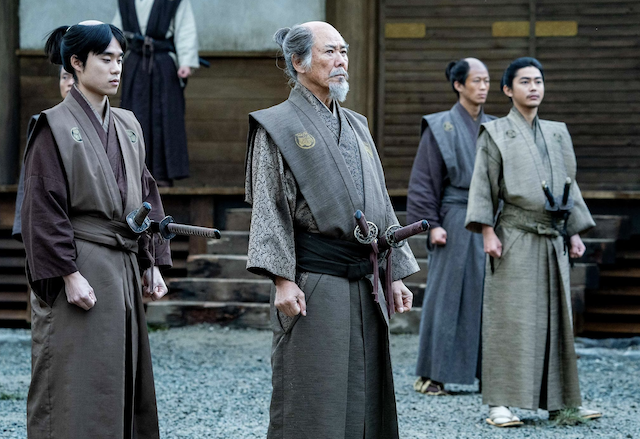
© 2024, FX. All Rights Reserved.
Q : How about other Japanese actors, such as Tadanobu Asano, Takehiro Hira, and also Fumi Nikaido and others? Were you also involved in the casting process?
Eriko Miyagawa: I was on and off on the casting process. I think just a lot of things are quite sensitive. Yeah, I don’t know how much I can talk about that, but obviously a lot of people were interested in working on the show. But at the same time, American productions typically require a very big time commitment. And this show was going to be shot in Canada during the height of Covid. So it was a big deterrent for a lot of the Japanese cast.
It was not a light decision for someone like Nikaido-san, who had so much going on in Japan to commit to the show and travel to Vancouver for such an extended period of time. And a lot of people were interested, but just simply couldn’t.
Q : Speaking of Vancouver, your team obviously shot this entire film in Vancouver, Canada, Talk about the location-scouting process of getting all that wonderful scenery in Vancouver.
Eriko Miyagawa: Yeah, I wish I was part of the location-scouting process in Vancouver. It was done by a local team, but even for the film Silence Vancouver was the top contender at one point, and it was my first time shooting in Vancouver, but it made total sense. All those amazing locations are within half an hour to one hour from downtown Vancouver, but if you are in Tokyo, you would drive for half an hour or one hour, and you’re still in the city. [Vancouver] has such a diverse richness of landscapes and availability of land. At the same time, the amazing crew in Vancouver was quite impressive. And I think it’s something that Japan doesn’t yet have.
Q : I heard that your team brought a Japanese chef to serve some Japanese food on the set. I imagine that it would get more people motivated to work on the set.
Eriko Miyagawa : Yeah, Moet (Nozaki Lee)-san. Yeah, it was everything because food is so important. And it was such a hard shoot. It was raining, it was cold, it was long, and food is so important. And this amazing chef, Moet-san, who would make Japanese sort of bento-style lunches every day. Originally at first it was just meant for the cast and crew who came from Japan.
But gradually I think everyone was like “What’s that? Oh, what do you have?” And more and more people wanted it. So the order kept growing and growing. But yeah it was great. It wasn’t like the typical teriyaki chicken. It was really like mentaiko(Spicy Cod Roe) pasta or Chikuzenni(simmered chicken and root vegetables), like real home-cooked Japanese food. And I think we cannot underestimate what a difference something like that kind of touch makes.
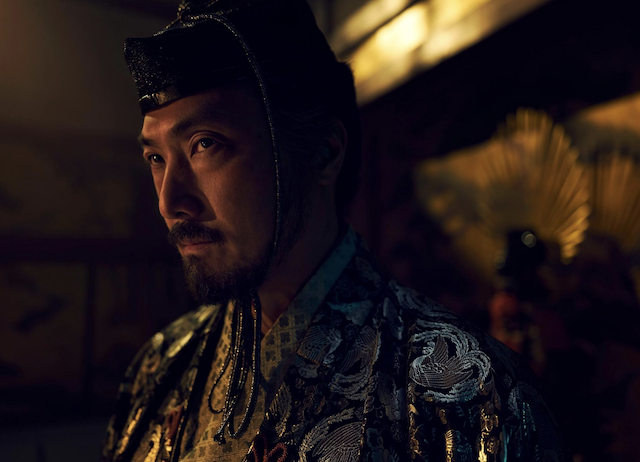
© 2024, FX. All Rights Reserved.
Q : As we know, Shogun has been picked up for a second and third season right now. I believe that James Clavell’s novel only covered the first season, didn’t it? So I’m curious to know what kind of story you guys are cooking up right now based on the true story of Ieyasu Tokugawa, which the character of Toranaga played by Hiroyuki Sanada is based on. So could you talk about what you guys are working on for the second season and third season?
Eriko Miyagawa: Yeah, we’re working on the second season one at a time. Writers are hard at work. They’ve been at it for I think over a month. And, yes, unfortunately, we finished the book. We didn’t know there was going to be season two. As it’s such an interesting chapter in Japanese history. It’s a very colorful phase, I think—just before getting into the Edo period, historical characters are fascinating, very colorful, very rich. And this is fiction, but I think we’re gonna be drawing a lot of inspiration from actual history, but I haven’t read a single page. I think I’m allowed to say that because Hiro said it on Stephen Colbert.
Q : Okay. So pretty much the same cast is gonna be there in the second season as well? Except the character who died.
Eriko Miyagawa: I know. If we knew there was gonna be season two, then yeah, we killed too many great people. There’ll be more. We’re very excited that there’ll be new characters. There’ll be more characters that will come back.
Q: Yeah, this series picked up 25 Emmy nominations, which is really phenomenal. So could you talk about the expectation of an Emmy award?
Eriko Miyagawa: Oh God, wow. I think getting nominated in and of itself is amazing. I don’t think we can really ask for more. I can’t believe I’ll get to go to the Emmys.
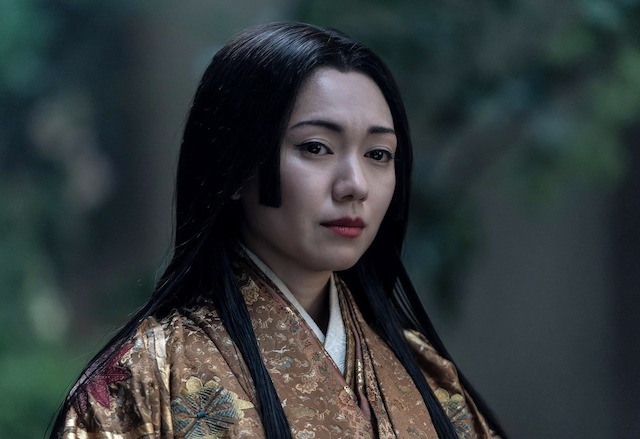
© 2024, FX. All Rights Reserved.
If you like this interview, share your thoughts below!

